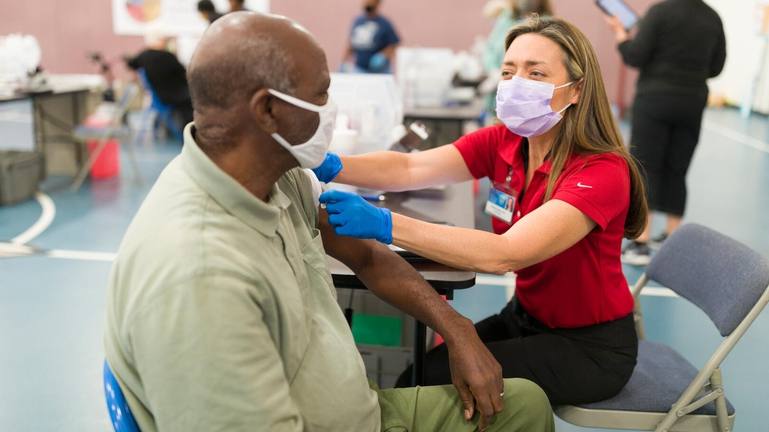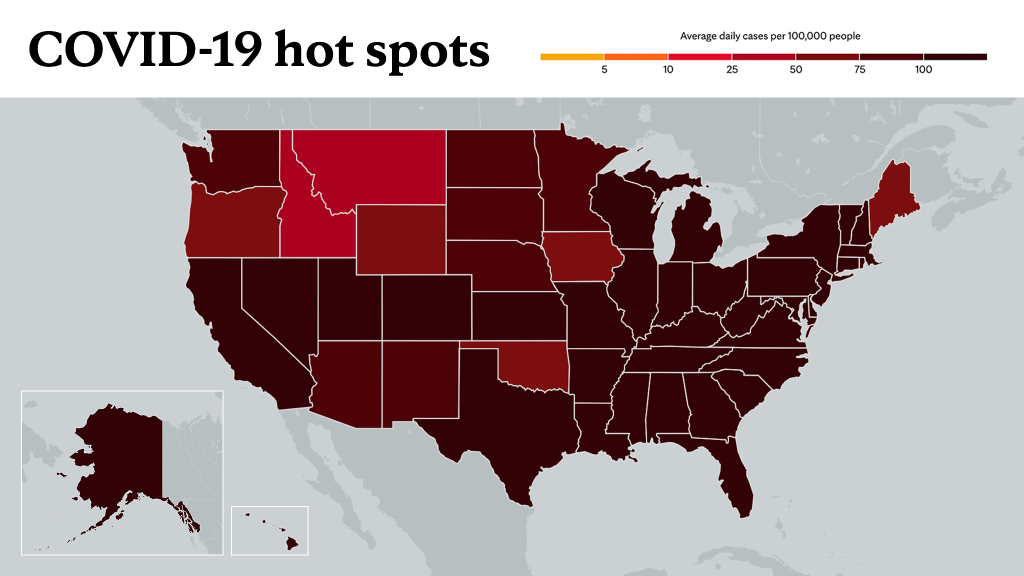-
COVID-19
Mayo Clinic experts debunk COVID-19 vaccine myths

COVID-19 vaccines protect you from getting sick. The Centers for Disease Control and Prevention (CDC) says people who are up to date with their COVID-19 vaccinations and booster shots are well-protected from serious illness and dying from the disease.
But millions of people in the U.S. remain hesitant or refuse to be vaccinated. As of early January, just 62% of the U.S. population is fully vaccinated and 75% have received at least one dose, according to Mayo Clinic's U.S. COVID-19 vaccine tracker.
The CDC encourages people to talk to their health care providers about COVID-19 vaccines and clear up much of the misinformation about these potentially lifesaving shots.
Watch: Mayo Clinic experts debunk COVID-19 myths.
Journalists: Broadcast-quality sound bites are in the downloads at the end of this post. Please "Courtesy: Mayo Clinic News Network."
In the meantime, Mayo Clinic experts debunk some common myths about COVID-19 vaccines:
MYTH: COVID-19 vaccines are not safe because they were rapidly developed and tested.
This is not true, according to Dr. Andrew Badley, an infectious diseases specialist and head of Mayo Clinic's COVID-19 Research Task Force.
"There was fast-tracking in the execution of the clinical trials. It's very important to know what parts were fast-tracked and which parts were not," says Dr. Badley. "The fast-tracked part were regulatory approvals, funding, data analysis and submission to the FDA (Food and Drug Administration). Those are all paperwork items. What was not fast-tracked was enrollment of patients, clinical follow-up of these patients, capturing the events which occurred and the follow-up. These trials were executed very well."
MYTH: I already had COVID-19 and recovered, so I don't need to be vaccinated for COVID-19.
This is not true, according to Dr. Abinash Virk, an infectious diseases specialist and co-chair of Mayo Clinic's COVID-19 Vaccine Allocation and Distribution Work Group.
"For the people who think that they've had COVID-19 and they don't need the vaccine, you still want to get the vaccine because it's going to give you long-term protection."
MYTH: The vaccines can give you COVID-19.
This is not true, according to Dr. Melanie Swift, an occupational medicine specialist and co-chair of Mayo Clinic's COVID-19 Vaccine Allocation and Distribution Work Group.
"They do provoke an immune reaction, which can cause symptoms. That shouldn't be confused with being harmful or being unsafe. It's actually what the vaccine is intended to do. And those symptoms include things like having muscle aches, having chills, having a headache, feeling tired. These are symptoms that people are very likely to experience after getting vaccinated for two to five days at most. They are not harmful, but they will be concerning to people if they're not expecting them."
MYTH: It's not safe for children to be vaccinated for COVID-19.
This is not true, according to Dr. Tina Ardon, a Mayo Clinic family medicine physician.
"The COVID-19 vaccine is extremely safe for our children. We have a number of studies that represent that. We've had a number of children who have already received the vaccines, and we have been able to monitor those children closely. And we feel very confident this is a safe and effective vaccine."
"Because the vaccine is extremely safe, extremely effective, we do feel that the benefit greatly outweighs any potential risks of the vaccine, which really, there are very minimal risks, if any. And the ones that we have noticed are things that we can take care of in the outpatient setting very easily. The risks of actually getting COVID-19 for our patients are quite significant. We see things like inflammation of the heart, chronic lung problems. Patients may need to be hospitalized, and even can die from COVID-19 infection."
MYTH: Young people don't get severely sick with COVID-19, so they don't need to be vaccinated.
This is not true, according to Dr. Virk.
"For the people who are young and healthy who think: 'I'm not going to get severe COVID. I'm not going to die from it,' for them, I want to say they should get the vaccine to protect themselves — because even young people can get severely ill. But more so, you should get vaccinated for your community, for your friends, for your family, and for your country. I would encourage every person to go out and seek your COVID-19 vaccine so that we can all go get back to our lives again."
MYTH: COVID-19 vaccines have severe side effects, especially for children.
This is not true, according to Dr. Ardon.
"The COVID-19 vaccines, in a lot of ways, are no different than the other vaccines we have available. They're administered in the same way, either in the arm or in the leg, depending on the age of the child. The doses are appropriate for the age of the child, as well. There's no special follow-up that has to happen after receiving a COVID-19 vaccine. And the side effects are quite similar to other vaccines, including fever, muscle aches but most likely pain, redness and swelling at the injection site."
For the safety of its patients, staff and visitors, Mayo Clinic has strict masking policies in place. Anyone shown without a mask was either recorded prior to COVID-19 or recorded in a nonpatient care area where social distancing and other safety protocols were followed.
Information in this post was accurate at the time of its posting. Due to the fluid nature of the COVID-19 pandemic, scientific understanding, along with guidelines and recommendations, may have changed since the original publication date.
For more information and all your COVID-19 coverage, go to the Mayo Clinic News Network and mayoclinic.org.
Learn more about tracking COVID-19 and COVID-19 trends.








